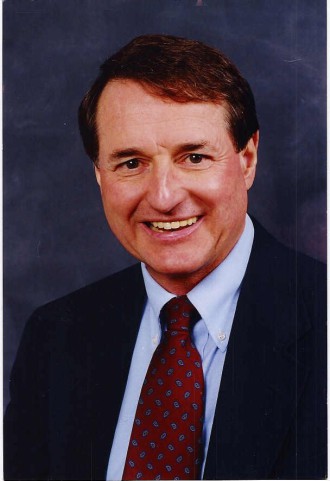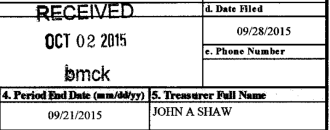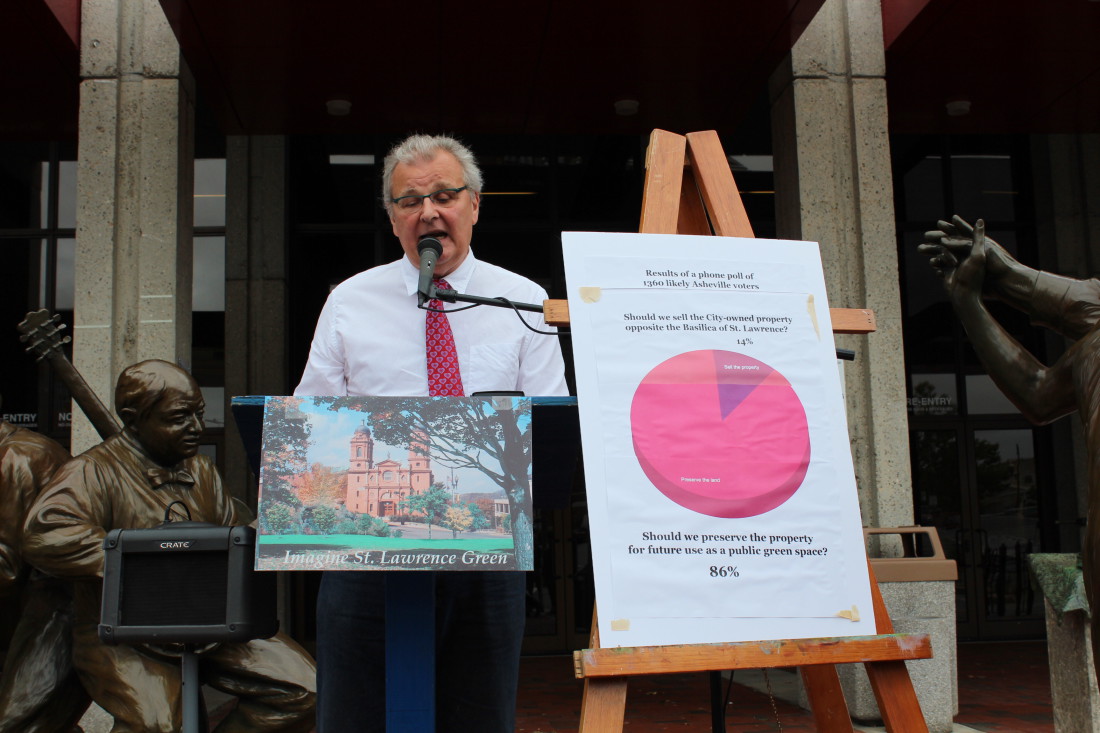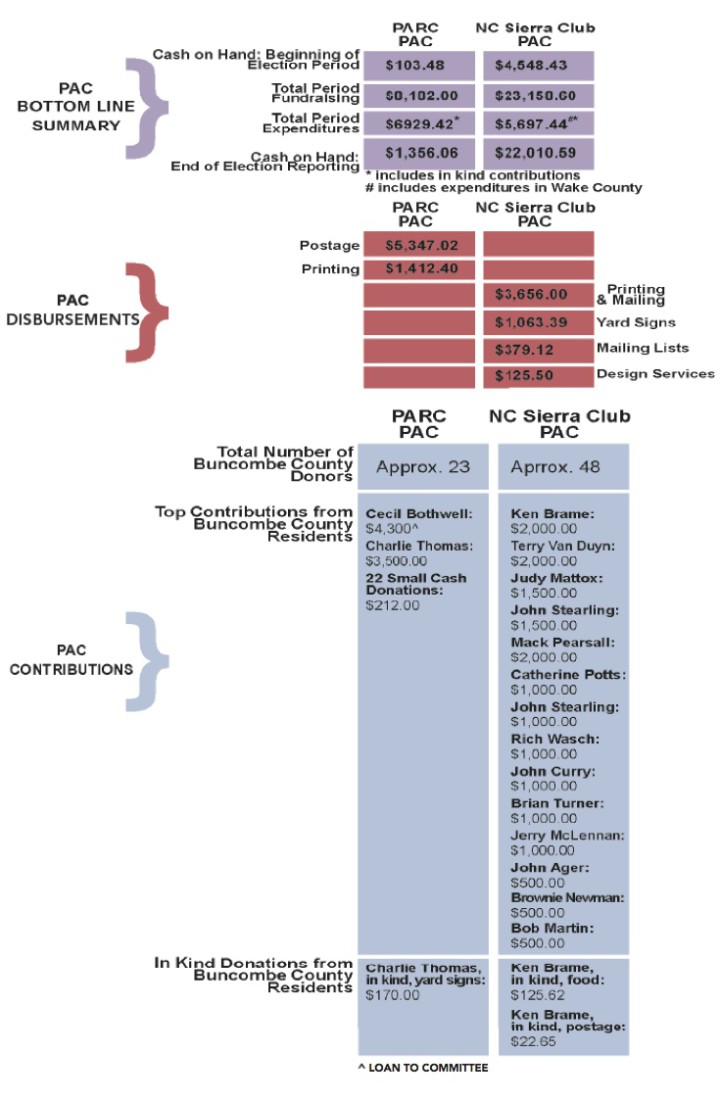No heads literally rolled in this year’s Asheville City Council election, but the results certainly turned heads. Turnout (12,113) was down 3.5 percent from 2013, but campaign spending amounted to over $12 per ballot cast (depending on how you count it). The outcome was unpredictable, with the candidates fighting to the end for every vote. And while the contenders spent well over $100,000 all told, a notable chunk of the money came from two state-registered, progressive political action committees.
State-level PACs don’t typically get heavily involved in campaigning for municipal candidates. But, as in so many things, Asheville broke the mold.
Despite being much maligned for their role in saturating politics with money, these fundraising entities also have a long history of bringing about change and pushing for causes that many Americans strongly support.
Much of the most controversial PAC activity has been at the national level, especially with the rise of so-called super PACs in the wake of the U.S. Supreme Court’s 2010 Citizens United v. Federal Election Commission ruling. In this year’s municipal election, however, Asheville has gotten an up-close-and-personal look at what happens when two heavy-hitting, state-level PACs face off in the political boxing ring.
PARC PAC (People Advocating Real Change) endorsed Brian Haynes, Keith Young and Rich Lee; well before the October primary, the group began publishing, mailing and handing out materials in support of those candidates.
Meanwhile, the political committee of the local Sierra Club chapter (under the auspices of the NC Sierra Club PAC) originally came out for Vice Mayor Marc Hunt and Julie Mayfield, adding Lindsey Simerly to the list after the primary. As the general election ballot took shape, both of these environmentally focused PACs planted a veritable forest of yard signs (colored green but nonrecyclable) promoting their preferred names.
And while individual candidates have a very public face, it’s often hard to tell who’s actually behind PAC activity. One way to get a handle on this is to follow the money. But in this case, most of the financial information became available only after the election.
Who’s behind the curtain?
PARC PAC grew out of People Advocating Real Conservancy (later changed to “Change”), an environmentally oriented nonprofit founded in 2003. PARC and its PAC have previously come out against proposed hotels and an attached parking deck in downtown Asheville. The PAC was initially registered federally, because it was producing signs supporting Barack Obama’s 2008 campaign. The group later also registered at the state level so it could support local candidates for state office.
A group of local activists, says Cecil Bothwell, a founder of both groups and treasurer of the political action committee, make the decisions for PARC PAC. “We have a kind of a flexible board. There are six to sometimes as many as 10 people, it’s not really formal, who get together and who are the principal people who contribute, though we take donations from anybody. A number of people have been active over the years.”
PARC’s involvement in this election, says Bothwell, who also serves on the Asheville City Council, was focused on one main goal. “I have tried, like hell, to get the council to pay attention to the people in the city on [the St. Lawrence Green] matter. None of my fellow council members are willing to do a poll, to hold forums. We do that for a lot of issues … but for some reason, Council is absolutely convinced to sell the property.” So last May, Bothwell, Charlie Thomas and Citizens for St. Lawrence Green, a separate, unregistered group that Bothwell says was Thomas’ brainchild, decided to push for a park across from the Basilica of St. Lawrence. “The goal was to make it an issue,” Bothwell explains. Together, they succeeded in making the fight over a tiny patch of property a wedge issue in the City Council race. “What we really hoped was that all the candidates might support the idea,” Bothwell reveals. “And it’s not so much the idea that it be a park as that we listen to the people.”

Two contributors are listed on PARC PAC’s 2015 pre-election report, filed Oct. 20. Bothwell lent the organization $4,300 and Thomas donated $3,500. The two also appear as contributors in PARC PACs first year filings along with eight other individuals.
In August 2012, PARC conducted a poll concerning three proposed outcomes for the parcel: a hotel, a park or purchase by the Diocese of Charlotte. Then, in September of this year, Bothwell’s own candidate committee conducted a similar poll, asking likely Asheville voters to choose between the city’s keeping the property and selling it. The results showed 86 percent support for keeping it. Some critics, notes Bothwell, have “denigrated [the September survey] as being a push poll,” but he disputes that. “I didn’t say one was evil and one was good: I said these three want to sell the property, and these three want to preserve the property. Do you want to sell it or do you want to preserve it? I don’t see that as being a push poll.”
The NC Sierra Club PAC has been around for at least 26 years, focusing mostly on state-level candidates and issues. Meanwhile, Ken Brame chairs the Wenoca chapter’s more recently formed seven-member Political Committee, a sort of local action division of the state-registered PAC. Like PARC PAC, the WENOCA committee has, through the NC Sierra Club PAC, endorsed and supported environmentally motivated candidates from president on down. In the recent City Council election, he explains, the committee made its endorsements “based on questionnaires sent to all 15 candidates in August.”
Officially, funds raised by the local group go into the Raleigh-based PAC’s war chest. The state-level Sierra Club’s political committee then approves re-allocating the money for use in local races. But “Unofficially,” says PAC Treasurer John Shaw, those approvals are “sort of based on their raising money. I can tell you that the people in Buncombe County are really good at raising money.”
Brame, meanwhile, has said the local group spent the most money it ever had on a City Council election because people it had identified as good environmentalists were “being attacked” over their positions concerning the viability of the St. Lawrence Green and “accused of not being good environmentalists.”
Who’s on first?
These two PACs’ involvement in local elections is nothing new: What’s different is the amount of money spent on such a small-scale contest. NC Sierra Club PAC spent at least $5224.01 (plus another $400 or more that’s not required to be reported) on the Asheville election, and PARC PAC spent at least $6,929.42.

Yet both the sources of that money and what it was used for remained hidden from the public view.
The procedures for PAC filing seem to have engendered some confusion among the Buncombe County Board of Elections, the State Board of Elections and both PACs’ treasurers.
The state board received the Sierra Club PAC’s pre-primary report Oct. 2, but it wasn’t posted on either agency’s website until after the Nov. 3 election.
When no reports were posted online after the primary, Xpress queried the state board, which said Buncombe County should have them. The county board, however, said that PARC PAC, at least, hadn’t filed anything. Contacted a week before Election Day, however, the treasurers of both PACS said they’d filed the required reports. And in a Nov. 3 email, Sheryll Harris, a compliance specialist at the state board, wrote: “The Buncombe BOE should have the filings for both PACs. At this time I do not believe it was the intention of either PAC not to file the required reports.”
Paperwork problems
Political action committees have broad powers in terms of endorsement and outreach, but there are some legal restraints on their activities. State PAC treasurers, for example, must file paperwork indicating where their money comes from and how it’s spent. Typically, this means filing quarterly reports in even-numbered years and bianually in odd-numbered years.
When a state-registered PAC tries to influence a municipal election, however, those reports must be filed on the same schedule followed by the candidates themselves. According to N.C. GS 163-278.40J, the Asheville election cycle is a “type 3 – nonpartisan with primary” requiring reports before both the primary and the general election; this year, those deadlines were Sept. 28 and Oct. 26 for activity periods ending Sept. 21 and Oct. 19, respectively. “Expenditures to influence the Asheville City Council election should be reported to Buncombe County,” says Harris, with informational copies to the State Board of Elections.
Instead, however, Shaw filed the Sierra Club PAC’s full pre-primary and pre-election reports with the state board and summaries with the Buncombe County board. “It was my understanding,” he explains, “that they would then distribute that information to the Buncombe County board.” The confusion, says Shaw, was because they’re a state-registered PAC that, this year, was participating in local elections in both Buncombe and Wake counties.
Bothwell, meanwhile, says he filed only a pre-election report for PARC PAC, because the group’s financial activity didn’t start till after the pre-primary reporting period. PARC PAC did send out at least one batch of mailings before the primary, but it’s possible that no money was actually spent before the pre-election reporting period the began on Sept. 22. In the week before the primary, Bothwell explains, “We were scrambling to get the mailers printed and out. It was after the September [filing] cutoff, I’m sure. We weren’t going to send mailers, then we decided well, we’d better.”
The PAC’s report, which covers activity beginning Sept. 1, does show an in-kind contribution of yard signs by Thomas on Sept. 21, with a listed value of $170 — the only mention made of such signs. All other listed expenditures are for printing and postage.
Asked if that dollar figure was accurate, Thomas replied, “I think you’re right: There would be more for the signs.” Bothwell says more signs were purchased after the Oct. 19 deadline, and they’ll be included in the end-of-year filing.
Earlier this year, PARC PAC was fined $250 for missing a January filing deadline. In May, before paying the fine, Bothwell donated $150 to PARC PAC.
“Going back to 2013 endorsements PARC PAC made for the City Council election,” he notes, “I filed with the State Board of Elections, and there was never any question from them about that. … I know that when I finally straightened things out with the state this year, Sheryll Harris said they wanted the filings done with Buncombe County instead of with the state board, and they forwarded my filings to the county.”
The Sierra Club PAC, meanwhile, has had its own problems with paperwork. In 2000, the organization was audited for discrepancies in its reporting and for providing insufficient information. And in 2011, a $150 penalty for missing a filing date wound up being waived.
Who knows?
In North Carolina, the State Board of Elections is responsible for overseeing the elections process and campaign finance disclosure. In conjunction with the county boards of elections, the state agency receives and reviews those reports, but it doesn’t immediately investigate potential irregularities unless it receives a complaint or an irregularity is eventually uncovered by an auditor. Thus, making those filings available in a timely manner is just about the only way voters can gain access to information that could influence their choices on Election Day.
Apparently, however, the state and county boards have sorted out the confusion, and all the PAC filings are now available, along with other reports and amendments, on the Buncombe County Board of Elections website. But since even the pertinent government agencies seem to have trouble sorting out the complex rules, who can say what further public scrutiny of local PAC activity might reveal?





“And it’s not so much the idea that it be a park as that we listen to the people.”
The petition at the St. Lawrence Green web site reads, in its entirety.
“We, the undersigned, hereby request that Asheville City Council preserve the city-owned property in front of the Basilica of St. Lawrence for future use as public green space, and vote against the sale of that property for commercial development.”
I tried to increase voter turnout through a competition of innovative community strategy and demonstration of collaboration skills on the part of candidates early in the primary. I talked about more campaign money not equating to better ideas or increased turnout. There was essentially no interest in trying anything new.
Increased city council race turnout means setting a goal of minimum 40 percent turnout for both the primary and general and as a community—certainly with government out front—developing a plan and deploying that plan. That process needs to start this January as we are in the hole on democracy performance, even at the municipal level.
Tiny slivers of activists are deciding our politicians. ‘Elected official’ does not mean mandate of the people by any means these days. It’s a little scary to imagine what we’d get with more voter participation. But maybe great things will happen with a new way.
Innovating the process determining future Asheville city council members
http://sustainnc.com/innovating-city-council-races/
Voter Turnout Plummeting in Local Elections
http://www.governing.com/topics/politics/gov-voter-turnout-municipal-elections.html
the local ‘clueless masses’ are so self absorbed , they are oblivious to local elections. it’s why AVL has a history of leadership problems.
Oh, Fisher! I love hearing you talk about how everyone else is clueless!
Elected officials; for sale to the highest bidder; USA incorporated
“Thomas’ brainchild: to push for a park across from the Basilica of St. Lawrence. ”
That’d be real nice for Thomas. He lives right next door.
http://bit.ly/213oSGF
Vote for the crook.
It’s important.